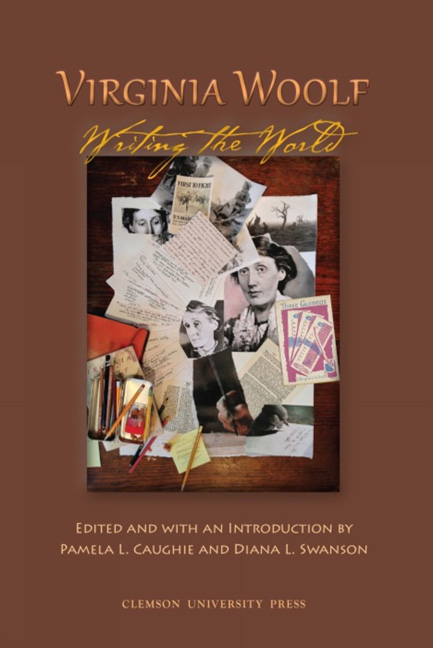Book contents
- Frontmatter
- Table of Contents
- Introduction
- Acknowledgmen
- Abbreviation
- WAR AND PEACE
- WORLD WRITER(S)
- Teaching Privileges: Three Guineas and the Cost of Global Citizenship
- From Guineas to Riyals: Teaching Woolf in the Middle East
- Fashionable Misconceptions: The Creation of the East in Virginia Woolf's Orlando
- From London to Taipei: Writing the Past in “Wandering in the Garden, Waking from a Dream” and Mrs. Dalloway
- An Estranged Intimacy with the World: The Postcolonial Woolf's Planetary Love in The Voyage Out
- “Shakespeare's Sister”: Woolf in the World Before A Room of One's Own
- Leonard Woolf: Writing the World of Palestine, Zionism, and the State of Israel
- ANIMAL AND NATURAL WORLD
- WRITING AND WORLDMAKING
- Notes on Contributors
- Conference Program
- Appendix: Virginia Woolf Conference Exhibit Items, Newberry Library
Fashionable Misconceptions: The Creation of the East in Virginia Woolf's Orlando
from WORLD WRITER(S)
- Frontmatter
- Table of Contents
- Introduction
- Acknowledgmen
- Abbreviation
- WAR AND PEACE
- WORLD WRITER(S)
- Teaching Privileges: Three Guineas and the Cost of Global Citizenship
- From Guineas to Riyals: Teaching Woolf in the Middle East
- Fashionable Misconceptions: The Creation of the East in Virginia Woolf's Orlando
- From London to Taipei: Writing the Past in “Wandering in the Garden, Waking from a Dream” and Mrs. Dalloway
- An Estranged Intimacy with the World: The Postcolonial Woolf's Planetary Love in The Voyage Out
- “Shakespeare's Sister”: Woolf in the World Before A Room of One's Own
- Leonard Woolf: Writing the World of Palestine, Zionism, and the State of Israel
- ANIMAL AND NATURAL WORLD
- WRITING AND WORLDMAKING
- Notes on Contributors
- Conference Program
- Appendix: Virginia Woolf Conference Exhibit Items, Newberry Library
Summary
In Virginia Woolf's Orlando (1928), Constantinople plays the role of an androgynous, Othered space. The relation between fashion and gender—a relationship particularly strong in England—breaks down in the East, allowing Orlando to wear non-gendered clothing and to act in ways which transgress typical gender roles. The use of Constantinople as an Orientalized, sexualized, and yet un-gendered space in the novel has been well noted by critics. What has not been explored is that Woolf's portrayal of Constantinople and of the East is a mis representation; there is no evidence to suggest that the fashion or culture of Turkey or the Ottoman Empire was ever more androgynous than that of England. This paper explores Woolf's purposefully inaccurate portrayal of Turkish fashion in Orlando and argues that such misrepresentation serves as a critique of a Victorian literary tradition which portrayed the colonized East as feminized, androgynous, and Sapphic. In making such an argument, I first discuss the role of satire in Orlando and the novel's position in relation to the English literary tradition as seen in the dedicatory preface. I then examine the depiction of Eastern fashion in the Constantinople scenes of Orlando, suggesting that the ironic portrayal of the East as androgynous and feminized can be read as an engagement with a specific element of the Victorian literary tradition: the eroticization and over-sexualization of the East and the xenological discourse which dominated Victorian perceptions of the Other. I track such discourse beginning with the letters of Lady Mary Wortley Montagu, one of the first Western women to write from and about Constantinople and with whose work Woolf was familiar. Montagu's Turkish Embassy Letters can provide insight into the Victorian misconceptions against which Woolf levies a critique through her satirical portrayal of Turkish fashion in Orlando .
Turkey, the setting for Orlando's sex change, plays the role of Woolf's androgynous ideal. While still in his official capacity as an ambassador to the British Empire, Orlando wakes every morning and “wrap[s] himself in a long Turkish cloak” (O 88); following the rebellious uprising and his sex change, she “dresse[s] herself in those Turkish coats and trousers which,” the narrator tells us, “can be worn indiff erently by either sex” (103).
- Type
- Chapter
- Information
- Virginia Woolf: Writing the World , pp. 104 - 109Publisher: Liverpool University PressPrint publication year: 2015

